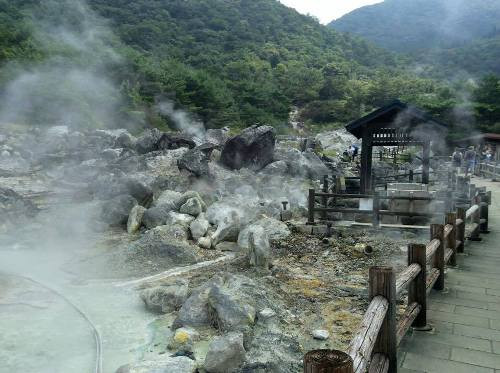Things to know when bathing nude in Japan
Visitors must be completely naked before bathing in the hot water. They should not eat, drink or smoke while bathing and should bring their own towels.
Japan is a top destination for onsen bathing. Hot springs stretch from the northern island of Hokkaido to the southern peninsula of Kyushu, so it's easy to find a relaxing spot.
 |
| Unzen Town in Nagasaki, a famous onsen area in the Kyushu Peninsula. Photo: Van Trai. |
There are two types of onsen baths: public baths and private baths. Depending on the destination and preferences, visitors can choose their favorite type of onsen. Open-air public onsen, private onsen are integrated into traditional Japanese-style inns, suitable for those who are shy about being naked in crowded places or small families.
However, no matter which method you choose, visitors need to understand basic Japanese onsen bathing culture and follow certain rituals.
Pay attention to the entrance
In most public onsen, the entrances are separated by blue and red curtains. Along with gender symbols, blue curtains are the male entrance and red curtains are the female entrance.
Leave your belongings in a private area
This is also the changing area and storage area for personal belongings. Each visitor chooses a locker to store their personal belongings. Visitors must wear the key on their hand even while bathing.
Full nudity
This is an important rule that tourists need to remember and no one is an exception. The Japanese believe that when enjoying elegant pleasures, all distances are eliminated. Noble and elegant costumes will be removed to blend in and enjoy nature.
Cleanse the body
Before entering the warm water, visitors need to wash their bodies clean. The bathing area is also located in the onsen bath area, but is located in a separate corner, with chairs, small bathtubs and shampoos. Visitors can bring their own soap and shower gel if they want.
Bring your own towel
All onsen baths offer towels for rent, but visitors should bring their own towels to feel comfortable when using them. Two large towels and one small towel to cover sensitive areas when walking around the onsen area is appropriate. In particular, visitors should not bring towels down into the hot tub but leave them on the edge or on their heads when bathing.
Test the water temperature
While bathing, visitors should use hot water to let their bodies get used to the temperature. Before getting in, soak your feet for a few minutes to feel the temperature. After getting used to the hot water, visitors can enjoy comfortable moments with the warm water and the cold winter weather.
No photography
Do not use cell phones or cameras in public baths. Most Japanese people respect each other’s privacy, so you should know this to avoid misunderstandings and being considered impolite.
Ban people with tattoos
Traditional Japanese tattoos are associated with the Japanese yakuza, a gang of gangsters, and they can be intimidating to other visitors. Therefore, onsen areas prohibit tattoos, and some Japanese with tattoos are aware of this, so they rarely enter onsen. However, foreigners are allowed to enter if their tattoos are within the prescribed limits.
No eating and smoking
Smoking in public is prohibited in Japan, and eating in the onsen area is also not allowed. In areas where sipping hot sake is allowed, visitors need to ask at the reception desk. If you want privacy and are allowed to do so, choose a traditional Japanese inn.
Wipe your body thoroughly after bathing.
Natural Onsen are all natural minerals that have the ability to heal and relax the body in harmony, so they have a very distinctive smell. Therefore, visitors need to clean their entire body and relax in the integrated massage areas, or go to the food court to enjoy traditional Japanese dishes.
According to VNE
| RELATED NEWS |
|---|


